
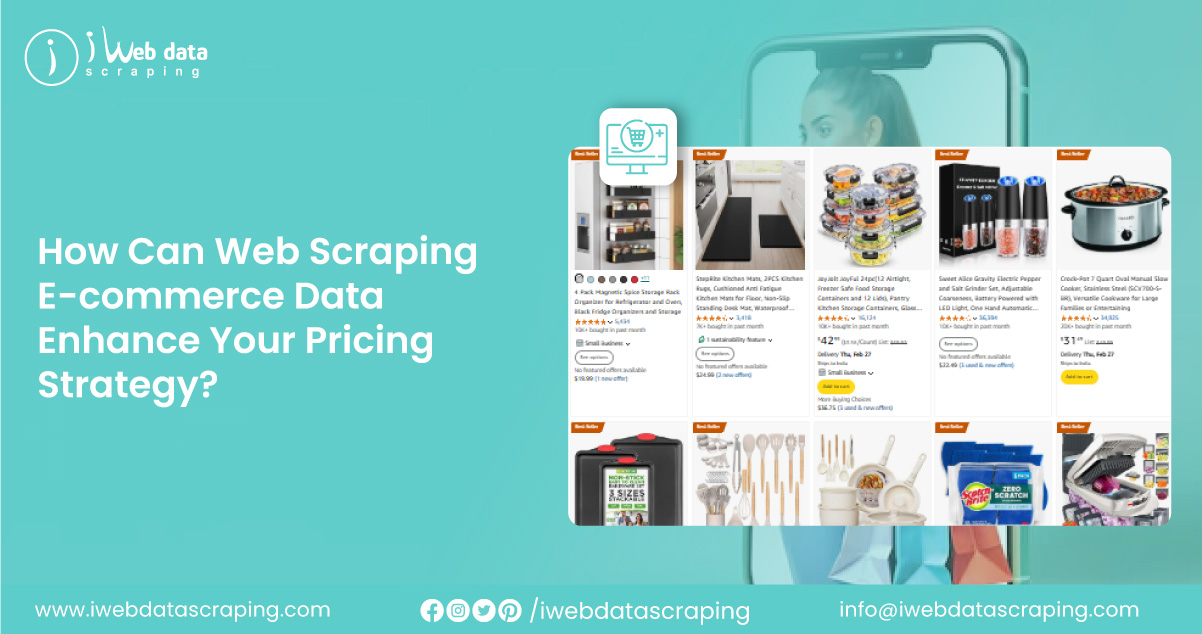
In today's highly competitive e-commerce landscape, price monitoring and strategy are critical components for businesses looking to maintain their market position. With the rapid growth of online retail, consumers now have access to vast amounts of product information at their fingertips. This has created both opportunities and challenges for businesses in the retail sector. To stay competitive, e-commerce companies need to constantly monitor their pricing strategies and adapt to changes in the market in real-time. One of the most effective ways to do this is by leveraging Web Scraping E-commerce Data.
Web Scraping for E-Commerce Price Monitoring and Strategy is the process of collecting data from websites in an automated manner. For e-commerce businesses, this can involve scraping product details, prices, availability, and other relevant information from competitor websites, marketplaces, or comparison platforms. By utilizing web scraping tools, companies can track price fluctuations, gather competitor pricing data, and gain insights into consumer behavior, which are invaluable for refining pricing strategies and enhancing competitive positioning. Extracting E-commerce Price Data allows businesses to stay on top of market changes and respond swiftly to optimize their product pricing, promotions, and inventory strategies.
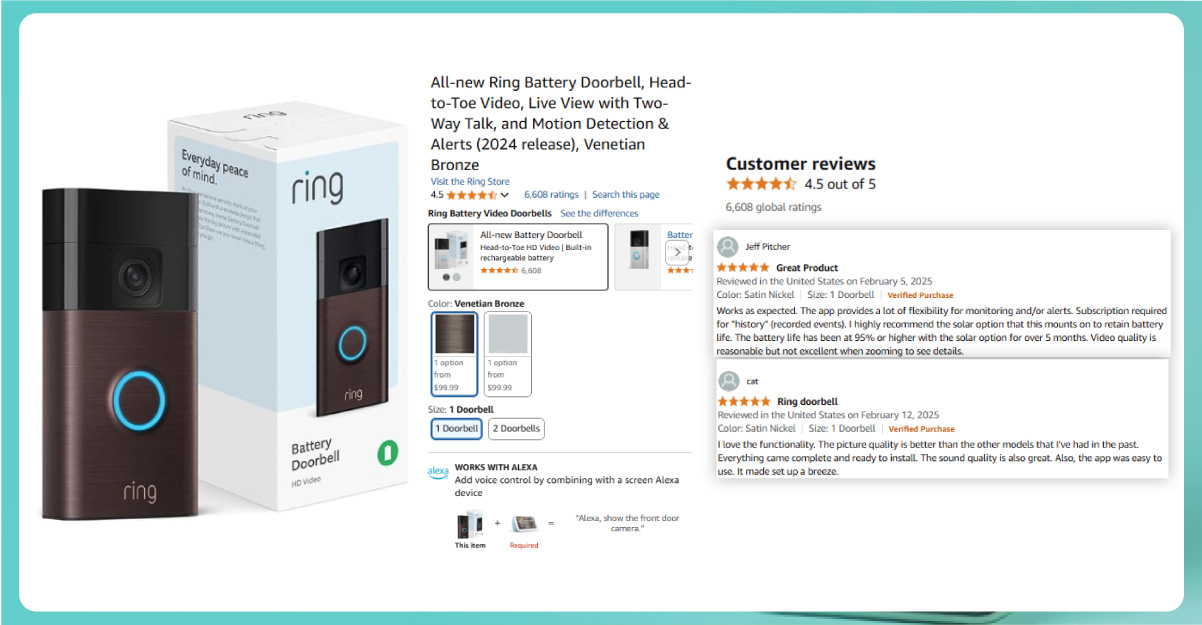
Price is one of the most important factors influencing purchasing decisions in the online marketplace. With more consumers turning to the Internet for price comparisons, businesses that fail to monitor and adjust their pricing strategies risk losing customers to competitors. Moreover, pricing is not static; it changes frequently based on supply and demand, promotions, and competitor actions. Real-time price monitoring is essential to stay ahead in the e-commerce game
The rise of dynamic pricing – where prices fluctuate in real-time based on various factors such as demand, competitor prices, and market conditions – has further heightened the importance of price monitoring. This strategy allows businesses to adjust their prices based on market conditions, ensuring they remain competitive and continue attracting customers. Data Extraction to Monitor E-commerce Prices is crucial in helping businesses stay informed about market changes. Competitor Price Data Extraction allows e-commerce companies to gather information about competitor pricing strategies, enabling them to adapt and optimize their pricing models quickly. By leveraging these tools, businesses can ensure their prices remain attractive and competitive, ultimately improving customer acquisition and retention.
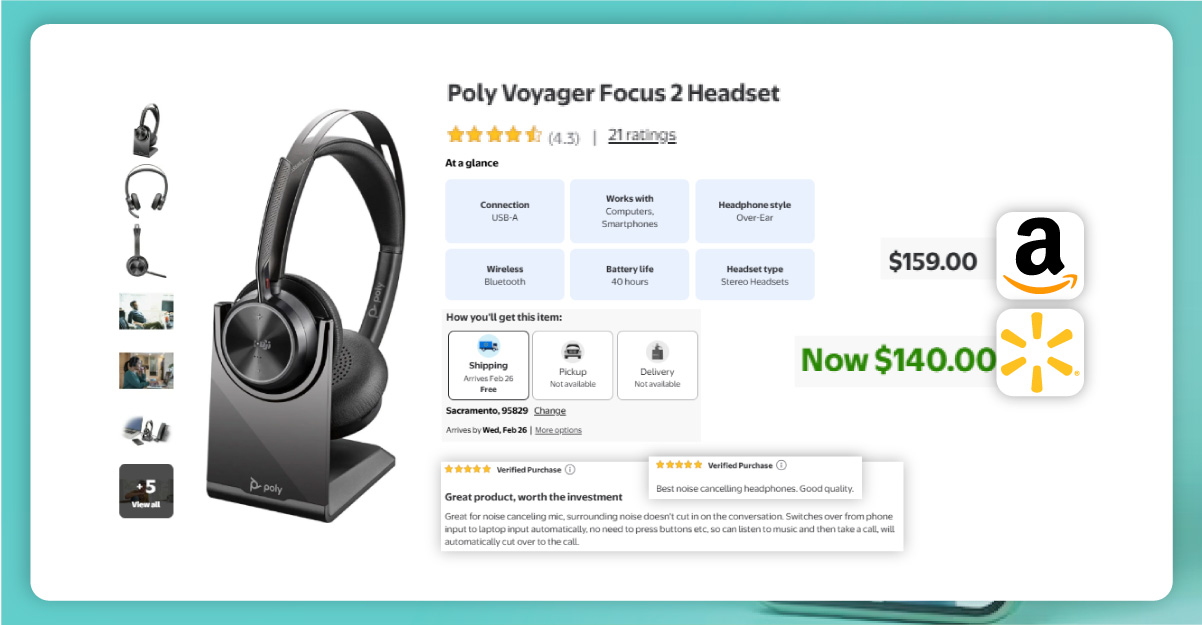
Web scraping tools can collect data from multiple e-commerce websites, including information on product prices, promotions, discounts, and stock availability. By aggregating and analyzing this data, businesses can clearly understand how their pricing compares to competitors and identify any gaps or opportunities for optimization.
For instance, a retailer can use web scraping to track prices for a particular product across various online stores. By monitoring competitor prices, the retailer can ensure their product remains competitively priced. If competitors lower their prices or offer promotions, the retailer can quickly adjust their prices to retain their customer base. This ability to react to competitor pricing strategies in real time is crucial in maintaining a competitive advantage. Scraping E-commerce Websites for Dynamic Price Adjustments allows businesses to keep their prices aligned with market trends and consumer expectations.
Additionally, web scraping can provide insights into the timing and frequency of price changes. Some retailers adjust prices based on demand fluctuations, holidays, or special events. By scraping pricing data over time, businesses can identify patterns in competitors' pricing strategies and adjust their strategies accordingly. For example, a retailer can anticipate such changes and plan promotions if a competitor lowers prices during a particular season or event. Leveraging Ecommerce Data Scraping Services ensures businesses stay informed and agile, maximizing their pricing strategies for continued growth and success.
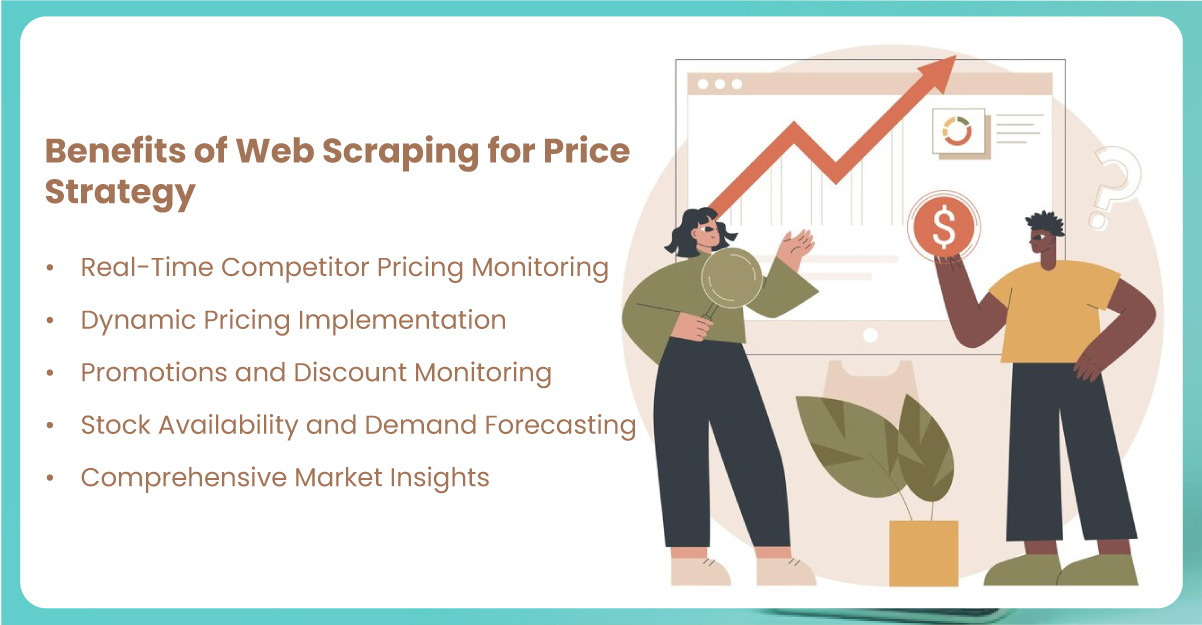
Web scraping offers valuable insights for price strategy by enabling businesses to track competitor pricing, monitor market trends, and optimize their pricing models. By gathering real-time data, companies can make data-driven decisions, improving competitiveness and maximizing profitability.
Real-Time Competitor Pricing Monitoring: One of the most significant advantages of web scraping is the ability to track competitor prices in real-time. By continuously monitoring competitors' pricing strategies, businesses can ensure they remain competitive and avoid pricing themselves out of the market. If competitors drop their prices, web scraping can provide instant alerts, allowing businesses to adjust their pricing to match or undercut the competition.
Real-time competitor price monitoring also helps e-commerce businesses identify pricing trends. For example, businesses can analyze these patterns to inform their pricing decisions if a competitor consistently raises or lowers prices on a particular product category. This type of data-driven decision-making allows e-commerce companies to maintain a competitive edge. Using Ecommerce Products and Reviews Datasets can enhance this process by offering detailed insights into product performance and customer feedback, further informing competitive strategies.
Dynamic Pricing Implementation: Dynamic pricing is a strategy that adjusts prices based on various factors, including competitor prices, demand, time of day, and more. Web scraping plays a key role in dynamic pricing by providing real-time data that can be used to adjust prices automatically.
For example, a business selling electronics may use web scraping to monitor the prices of similar products across multiple online retailers. If demand for a particular product increases, the company can adjust the price accordingly to maximize profits. Conversely, the company can lower the price if demand decreases to remain competitive.
Major retailers like Amazon have widely adopted dynamic pricing strategies, constantly adjusting their prices based on competitor pricing, demand, and other factors. By leveraging web scraping, businesses of all sizes can implement similar strategies to optimize pricing and drive sales. Utilizing an Ecommerce Data Scraper can streamline this process, ensuring businesses can gather and analyze vast amounts of data across various platforms in real time.
Promotions and Discount Monitoring: In addition to tracking regular price changes, web scraping can also be used to monitor promotions and discounts offered by competitors. E-commerce businesses can scrape data from promotional campaigns, sales events, and discount codes to understand how competitors price their products during special events.
This information can help businesses adjust their promotions or plan targeted sales events. For instance, if a competitor is running a Black Friday promotion with significant discounts, a business can use web scraping to identify which products are being discounted and adjust their own sales strategies accordingly.
Moreover, businesses can track the timing and frequency of promotions. If certain competitors frequently offer discounts on specific products or categories, it may indicate a pattern businesses can use when planning their promotional campaigns. Using Ecommerce Data Intelligence, businesses can make smarter, data-driven decisions that maximize their promotional impact and increase customer retention.
Stock Availability and Demand Forecasting: Web scraping is not limited to price tracking; it can also monitor stock availability across competitors. By tracking product availability in real-time, businesses can gain insights into supply chain dynamics and identify opportunities for improvement.
For example, if a competitor runs out of stock on a high-demand item, a business can capitalize on this gap by offering the same product at a competitive price. By monitoring stock availability over time, businesses can forecast demand trends and adjust their inventory levels accordingly. This allows them to avoid overstocking or understocking, which can result in lost sales.
Comprehensive Market Insights Beyond price tracking, web scraping can provide businesses with comprehensive market insights. For example, businesses can scrape product reviews, ratings, and customer feedback from e-commerce websites to understand customer sentiment and identify areas for improvement. Analyzing competitor products and their features can help businesses identify gaps in their offerings and enhance product development.
Web scraping also enables businesses to track changes in market trends. For example, web scraping can provide immediate access to this information if a competitor starts offering new products or entering new markets. This allows businesses to react quickly to changes in the market and adjust their strategies accordingly.
Stay ahead effortlessly with iWeb Data Scraping's real-time e-commerce price monitoring.
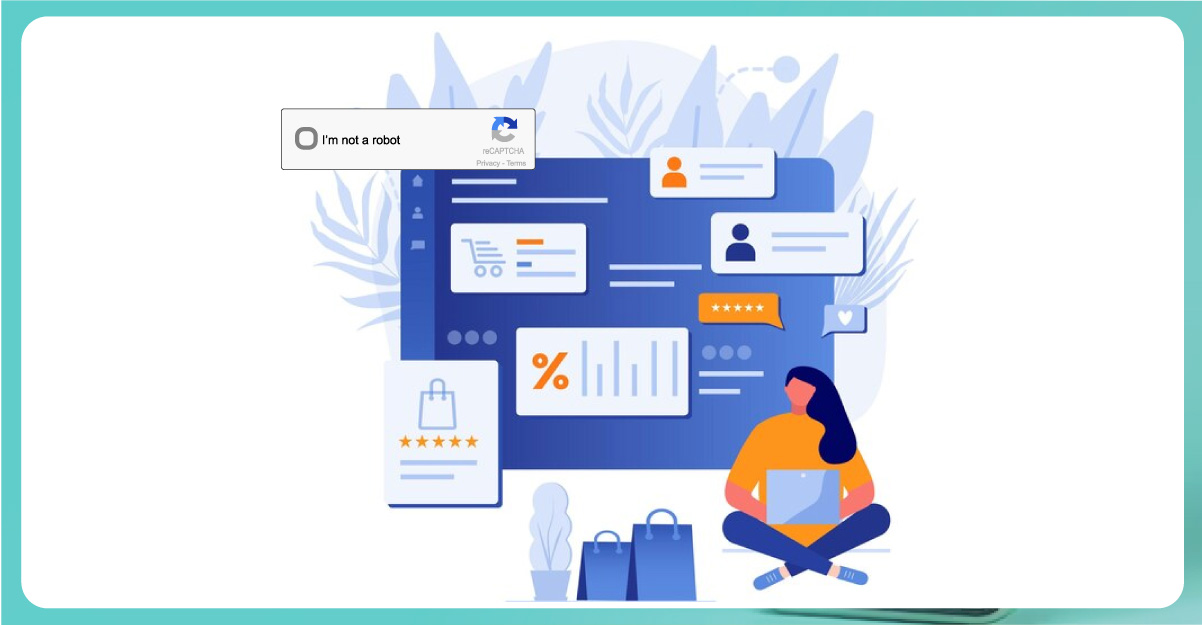
While web scraping offers numerous advantages, its implementation also presents challenges. For instance, many websites use techniques to prevent web scraping, such as CAPTCHA tests, IP blocking, and rate-limiting. Overcoming these obstacles requires sophisticated scraping tools and techniques, such as rotating proxies or CAPTCHA-solving services.
Another challenge is ensuring data accuracy. Since web scraping involves extracting data from external websites, incorrect or incomplete data is always possible. To mitigate this risk, businesses should invest in data validation techniques and regularly update their scraping algorithms to ensure the data remains reliable.
Finally, businesses must know legal and ethical considerations when scraping data. Some websites prohibit web scraping in their terms of service, and scraping without permission may result in legal repercussions. Therefore, businesses must ensure that they comply with all applicable laws and regulations before engaging in web scraping.
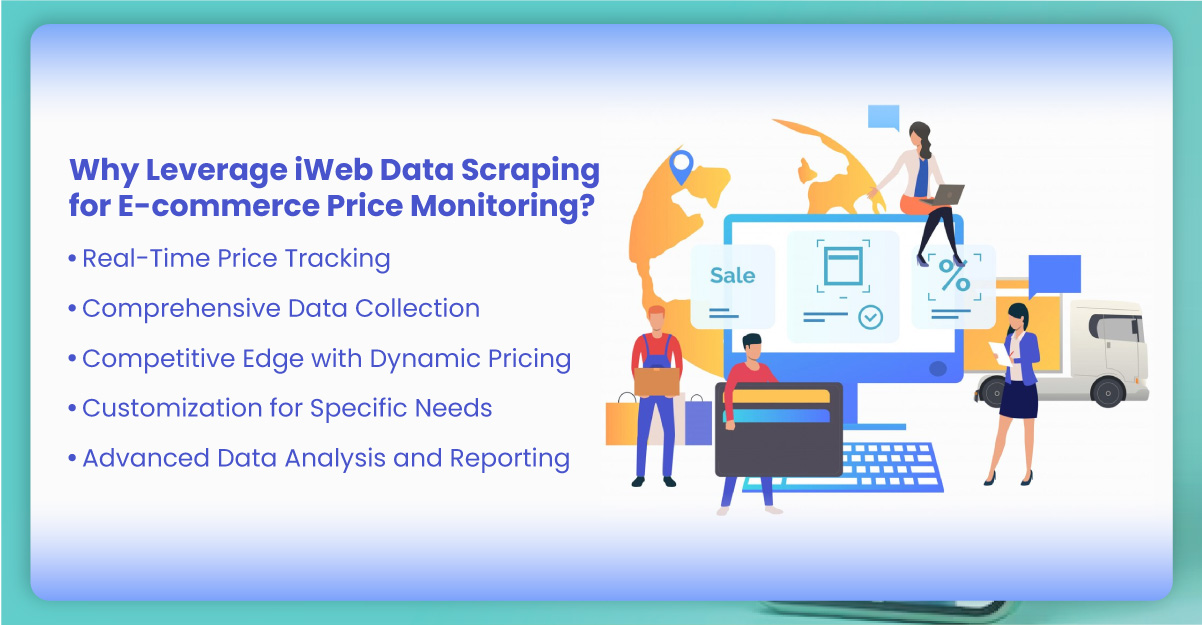
1. Real-Time Price Tracking: Our services provide real-time price monitoring across multiple e-commerce platforms, ensuring you stay competitive by promptly responding to market shifts and competitor pricing strategies.
2. Comprehensive Data Collection: We gather a wide range of e-commerce data, including product prices, promotions, discounts, and availability, offering a complete overview of your market landscape.
3. Competitive Edge with Dynamic Pricing: We analyze competitor pricing strategies and help you implement dynamic pricing, ensuring you can adjust prices based on demand, competitor activity, and market trends.
4. Customization for Specific Needs: Our solutions are tailored to your business needs. They allow you to monitor specific products, categories, or competitors, giving you targeted insights that are most relevant to your pricing strategy.
5. Advanced Data Analysis and Reporting: We provide in-depth reports and analytics that help you identify trends, optimize pricing strategies, and maximize profitability, ensuring data-driven decisions for long-term success.
Web scraping has become essential for e-commerce businesses looking to stay competitive in a fast-paced and dynamic market. By enabling real-time price monitoring, competitor analysis, dynamic pricing, and promotional tracking, web scraping helps businesses optimize their pricing strategies and enhance their overall competitive positioning.
With the right tools and strategies, businesses can leverage web scraping to gain valuable insights into market trends, customer preferences, and competitor behavior. While challenges such as data accuracy and legal considerations exist, the benefits of web scraping for price monitoring far outweigh the risks. As e-commerce grows, web scraping will remain a key tool for businesses looking to succeed in the ever-evolving online marketplace.
Experience top-notch web scraping service and mobile app scraping solutions with iWeb Data Scraping. Our skilled team excels in extracting various data sets, including retail store locations and beyond. Connect with us today to learn how our customized services can address your unique project needs, delivering the highest efficiency and dependability for all your data requirements.